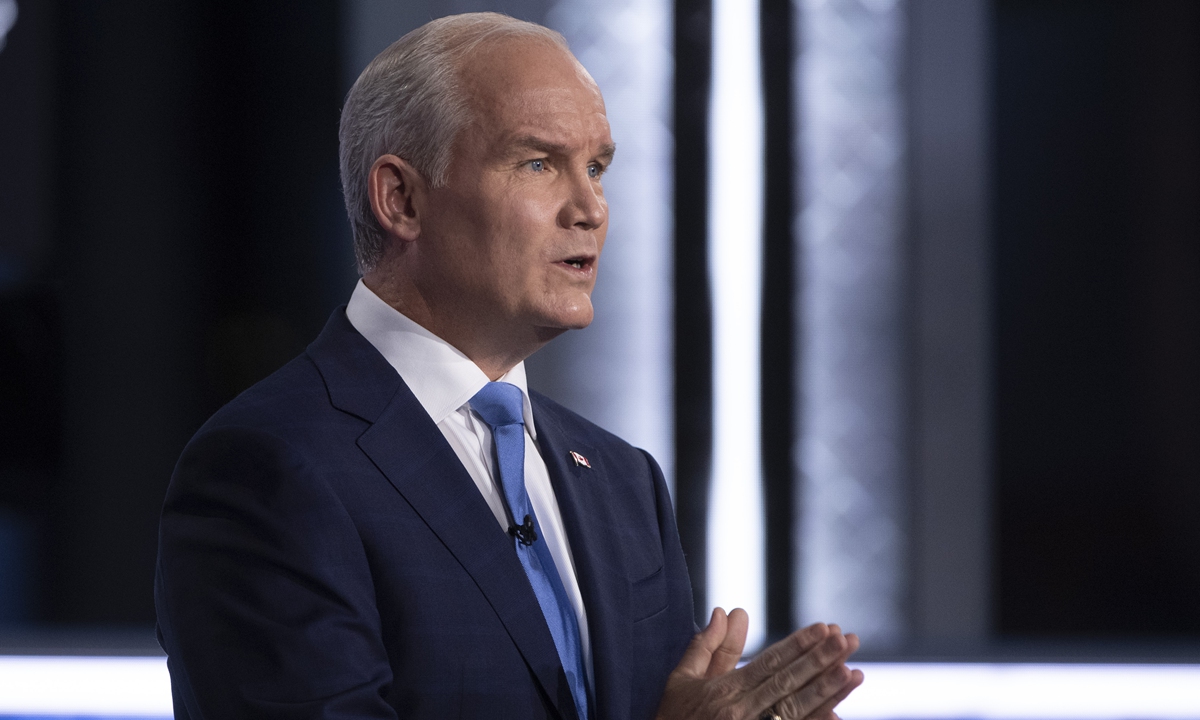
Erin O'Toole, leader of Canada's Conservative Party, speaks during a federal leaders' debate in Gatineau, Quebec, Canada, on Wednesday. Photo: VCG
The "unusually hostile" reference of Canada's Conservatives in their blueprint caters to the country's "toxic anti-China atmosphere," Chinese observers noted, warning that hyping China during an election is usually the Western politicians' "lip service" tactic. Yet if the Canadian government puts those hawkish words into action, it will invite counterstrikes from China, and Ottawa is the one to suffer.
When the Canadian election, which kicked off in mid-August and will end on September 20, turns white-hot with Liberals and Conservatives going head-on, the Canada-China topic had yet to become a focal point. That is until the Conservatives referenced China 31 times in their platform, in what observers called an "unusually hostile" stance.
Canadian media the Hill Times reported on Wednesday that the Conservative party, led by Erin O'Toole, outlines a government that would shift trade priorities away from China, including recognizing the "Chinese persecution of Uygur as genocide," banning Huawei from Canada's 5G infrastructure, and having "greater political cooperation" with island of Taiwan.
Chinese observers noted that compared with his opponent Prime Minister Justin Trudeau, Erin O'Toole, a former corporate lawyer and air force officer turned politician, is lesser known. After leading the Conservative party, O'Toole did not play a bigger role in Canadian politics, but concentrated on attacking Trudeau's policies.
After Trudeau called a snap election in mid-August hoping an early campaign could net his Liberals a majority government, O'Toole seeks to broaden the party's appeal and deflect potential concerns early by speaking about his support for LGBT rights and his pro-choice stance on abortion, and by courting unionized workers.
Hyping the China topic shows that the Canadian Conservative party has very few cards to play, and lacks good policies to appeal to voters. But taking such an unusually hostile attitude toward China shows that the party knows it can cater to domestic opinion, Li Haidong, a professor at the Institute of International Relations of the China Foreign Affairs University, told the Global Times.
Chinese Ambassador Cong Peiwu told The Hill Times on August 25 that some Canadian politicians have been putting "personal political interests" above Canada-China relations.
While stressing that China adheres to the principle of "non-interference in internal affairs" and that he would "not comment or interfere" in the Canadian election, Cong said that China "firmly" opposes anyone who is "hyping issues related to China or smearing China."
Li said that even as an opposition party, the Conservatives should take a "responsible" stance in dealing with China. "There may be no substantial consequences to pay for hyping the China issue during an election. But the Conservatives dare not stand up so hostile against China after taking office. So the promise it made won't turn into policies, which will end up being a 'face losing' situation for the Conservatives."
If those measures do turn into policies, needless to say, China will pay back with a strong counterstrike, and Canada will be the one to suffer, according to Li.
Relations between China and Canada have been frayed since Canada arrested Huawei executive Meng Wanzhou at the behest of the US government in 2018.
With less than two weeks to go, the race remains tight. Canadian media the Global News reported on Wednesday that the Conservatives' momentum appears to be building, with 35 percent of decided voters saying they would vote for the Tories. The Liberals would earn 32 percent of the vote, up one point.
Li said pollsters are hardly the final indicator of the election result, but he predicted this election will be a recurrence of Canada's 2019 election, when Trudeau's party won the most seats in parliament, but still failed to form a majority government.
The expert also pointed out that regardless of the election result, a deadlock between China and Canada is "structural," and the North American country will continue to serve as the US' toady to confront China.




